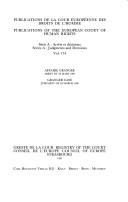| Listing 1 - 10 of 64 | << page >> |
Sort by
|
Book
Abstract | Keywords | Export | Availability | Bookmark
 Loading...
Loading...Choose an application
- Reference Manager
- EndNote
- RefWorks (Direct export to RefWorks)
Book
ISBN: 9782390700005 Year: 2022 Publisher: Bruxelles : Les impressions nouvelles,
Abstract | Keywords | Export | Availability | Bookmark
 Loading...
Loading...Choose an application
- Reference Manager
- EndNote
- RefWorks (Direct export to RefWorks)
Depuis son apparition remarquée dans le Poudlard Express, où elle disait déjà "tout savoir" de Harry Potter, Hermione Granger s'est imposée comme un des personnages les plus complexes et emblématiques de J. ? K. Rowling. Suscitant l'agacement par son perfectionnisme et son tempérament moralisateur, Hermione est dans le même temps d'une fidélité infaillible en amitié, pour laquelle elle est prête à réviser ses principes.Figure de l'esprit critique, celle qui maîtrise les sortilèges comme personne (Wingardium Leviosa) interroge cette autre forme de magie qu'est le pouvoir de la connaissance. Qu'elle soit attablée dans une bibliothèque, transporte une pile de livres ou épluche le journal, Hermione Granger collecte, compare et questionne des informations. Peut-être est-ce cela qui nous la rend si proche, lecteurs et lectrices de Harry Potter, occupés comme elle à lire et à découvrir les faits.Mais la jeune sorcière va plus loin. Hermione est une incarnation de la persévérance alliée au courage. Et c'est assurément ce qui en fait une icône accomplie de la rébellion dans la culture populaire de ces dernières décennies. Maître de conférences à l'Université de Liège et responsable de la collection "Espace Nord" , Tanguy Habrand est un spécialiste des questions touchant au monde éditorial et à l'objet-livre sous toutes ses formes.On lui doit notamment une Histoire de l'édition en Belgique (XVe- XXIe siècle) (avec Pascal Durand, 2018) et Le Livre au temps du confinement (2020). Serdaigle de coeur et d'esprit, il serait un des rares élèves de Poudlard à avoir suivi une formation par correspondance.
Book
Year: 1851 Publisher: Paris Adrien le Clere
Abstract | Keywords | Export | Availability | Bookmark
 Loading...
Loading...Choose an application
- Reference Manager
- EndNote
- RefWorks (Direct export to RefWorks)
Book
Abstract | Keywords | Export | Availability | Bookmark
 Loading...
Loading...Choose an application
- Reference Manager
- EndNote
- RefWorks (Direct export to RefWorks)

ISBN: 345221883X 9783452218834 Year: 1990 Volume: 174 174 Publisher: Köln Heymann
Abstract | Keywords | Export | Availability | Bookmark
Book
Year: 1851 Publisher: Paris: Librairie d'Adrien le Clère,
Abstract | Keywords | Export | Availability | Bookmark
 Loading...
Loading...Choose an application
- Reference Manager
- EndNote
- RefWorks (Direct export to RefWorks)
Book
ISBN: 9782711624102 Year: 2012 Publisher: Paris : Vrin,
Abstract | Keywords | Export | Availability | Bookmark
 Loading...
Loading...Choose an application
- Reference Manager
- EndNote
- RefWorks (Direct export to RefWorks)
Dans cette étude issue d'une thèse, l'auteur démontre l'originalité de l'oeuvre de Gilles-Gaston Granger dans la pensée française du XXe siècle.
Philosophy, French --- Philosophie française --- Granger, Gilles Gaston.
Book

ISBN: 2130464629 9782130464624 Year: 1995 Publisher: Paris : Presses universitaires de France,
Abstract | Keywords | Export | Availability | Bookmark
 Loading...
Loading...Choose an application
- Reference Manager
- EndNote
- RefWorks (Direct export to RefWorks)
Logic --- Knowledge, Theory of --- Granger, Gilles-Gaston --- --Granger, Gilles Gaston --- Argumentation --- Deduction (Logic) --- Deductive logic --- Dialectic (Logic) --- Logic, Deductive --- Intellect --- Philosophy --- Psychology --- Science --- Reasoning --- Thought and thinking --- Epistemology --- Theory of knowledge --- Methodology --- Granger, Gilles Gaston --- Granger, G. G. --- Granger, Gilles Gaston. --- Philosophie --- Théorie de la connaissance. --- Logique. --- Épistémologie. --- Logic. --- Knowledge, Theory of. --- Fondements. --- Granger, Gilles-Gaston, --- Critique et interprétation
Book
Abstract | Keywords | Export | Availability | Bookmark
 Loading...
Loading...Choose an application
- Reference Manager
- EndNote
- RefWorks (Direct export to RefWorks)
There is a growing appreciation that many psychiatric (and neurological) conditions can be understood as functional disconnection syndromes – as reflected in aberrant functional integration and synaptic connectivity. This Research Topic considers recent advances in understanding psychopathology in terms of aberrant effective connectivity – as measured noninvasively using functional magnetic resonance imaging (fMRI). Recently, there has been increasing interest in inferring directed connectivity (effective connectivity) from fMRI data. Effective connectivity refers to the influence that one neural system exerts over another and quantifies the directed coupling among brain regions – and how they change with pathophysiology. Compared to functional connectivity, effective connectivity allows one to understand how brain regions interact with each other in terms of context sensitive changes and directed coupling – and therefore may provide mechanistic insights into the neural basis of psychopathology. Established models of effective connectivity include psychophysiological interaction (PPI), structural equation modeling (SEM) and dynamic causal modelling (DCM). DCM is unique because it explicitly models the interaction among brain regions in terms of latent neuronal activity. Moreover, recent advances in DCM such as stochastic and spectral DCM, make it possible to characterize the interaction between different brain regions both at rest and during a cognitive task.
brain connectivity --- Granger causality analysis --- fMRI --- effective connectivity --- psychophysiological interaction --- dynamic causal modeling --- brain connectivity --- Granger causality analysis --- fMRI --- effective connectivity --- psychophysiological interaction --- dynamic causal modeling
Book
ISBN: 3960676646 9783960676645 3960671644 9783960671640 Year: 2017 Publisher: Hamburg, [Germany] : Anchor Academic Publishing,
Abstract | Keywords | Export | Availability | Bookmark
 Loading...
Loading...Choose an application
- Reference Manager
- EndNote
- RefWorks (Direct export to RefWorks)
Potter, Harry --- Potter, Harry James --- Granger, Hermione --- Weasley, Ron --- Rowling, J. K.
| Listing 1 - 10 of 64 | << page >> |
Sort by
|

 Search
Search Feedback
Feedback About UniCat
About UniCat  Help
Help News
News